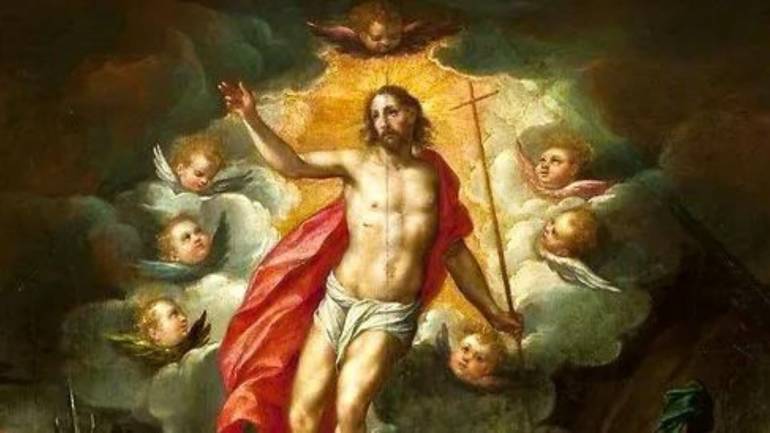Celebrating our risen king at Easter!

The Easter Cantata, BEHOLD YOUR KING by John W. Peterson, concludes with the lyrics of “Who will roll the stone away” by Peterson himself, put to music by Norman Johnson, whose racy, lilting composition leaves a delightful taste in the mouth long after it has been listened to.
The gospel narrative speaks about the women going to Jesus’ tomb at the crack of dawn that fateful Easter Sunday to embalm the body of their beloved Rabboni, saying to one another, “Who will roll the stone away from the entrance? For the avid Sacred Music aficionado, Peterson and Johnson bring alive the sight of the stone already rolled away, filling them with rare amazement and thrill.
Basis of Easter: At the heart of Easter is the joy of redemption on offer on different levels: REDEMPTION from the kind of situation we find ourselves in on account of personal issues; redemption from a host of prejudices we are either guilty of or which we find ourselves subjected to; prejudices that stem from preparation for Holy Week devoid of the all-important virtue of forgiveness. Indeed, the ultimate desire is to liberate ourselves from the shackles of non-freedom, a consequence of unforgiveness. The resultant experience of freedom is what Easter is all about!
Easter celebrates the fulfillment of God’s plan of Salvation which had His only-begotten Son, Jesus Christ, ensuring the restoration of the Father’s human creation to Paradise. Good Friday is paving the way! Paradise Lost, as a result of the sin of disobedience on the part of our first parents, Adam and Eve, is now Paradise Regained, as a result of Jesus’ Passion, Death and Resurrection.
The hope of justice and peace is alive again! Yet, if the joy of Easter is to envelop us fully, its significance must sink deep into us. This is best possible when we understand and appreciate Easter from a historical perspective. Factually, just as the Crucifixion and Death of Jesus aren’t figments of the imagination, his Resurrection as King of Eternal Glory that we celebrate at Easter is essentially concrete history.
Social implications: The word Easter is said to have come from a pagan figure called ‘Eastre’ (or Eostre), who was revered as the goddess of spring or of the East (from where the Sun rises) by the Saxons of Northern Europe and honored with a festival called Eastre during the spring equinox. Her insignia was the hare (a symbol of fertility)—hence the Easter Bunny! The Lily, a flower that is in glorious bloom during Spring, is mentioned frequently throughout the Bible and serves as a beautiful reminder of the significance of Easter, its magnificent whiteness symbolizing as it does the purity of new birth.
The obscurity of its origins aside, the significance of Easter, and the implications thereof are what matter—the new birth it is associated with being the Resurrection of Jesus Christ to new life on the third day of his death. Interestingly, the secular press is awash with reports about the renovation and upkeep of Jesus’ tomb! Why would this be the case if the events of the Resurrection were historically false? When viewed in the context of India, the Resurrection implies the assurance of the common man's entry into Eternal bliss by the Saviour—a hope that prevents one from giving in to despair when faced with excruciatingly painful circumstances in life, such as incurable illness, unemployment, the loss of a life partner, or, worse, the rising harassment of Christians in India and the rest of the world.
The Peace of Paradise Undoubtedly, the attainment of peace necessitates the recognition of truth and justice. “Foolish” as we all are, we are “so slow to believe the full message of the prophets” (Lk 24:25)! We tend to overlook the fact that we “enter into his glory” (Lk 24:26) not merely by suffering with him but by upholding the right to truth, ‘truth’ itself being none other than the Son of God whom Pilate mindlessly condemned to death. Silence in a situation that calls for speaking out for what is right by way of exposing all wrong deprives us of the very right to the joy of Easter that constitutes the peace of Paradise. Rejoice! For in the fostering of justice lies our experience of Easter! Alleluia!!








